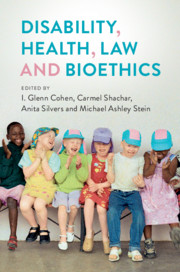Book contents
- Disability, Health, Law, and Bioethics
- Disability, Health, Law, and Bioethics
- Copyright page
- Dedication
- Contents
- Notes on Contributors
- Introduction
- Preface
- Acknowledgments
- Part I Disability: Definitions and Theories
- Part II Disability in the Beginning and the End of Life
- Part III Disability in the Clinical Setting
- Introduction to Part III
- 7 Expressing Respect for People with Disabilities in Medical Practice
- 8 Disabled Bodies and Good Organs
- 9 Humanizing Clinical Care for Patients with Disabilities
- 10 Chronic Pain As a Challenge for Disability Theory and Policy
- Part IV Equality, Expertise, and Access
- Part V Disability, Intersectionality, and Social Movements
- Part VI Quantifying Disability
8 - Disabled Bodies and Good Organs
from Part III - Disability in the Clinical Setting
Published online by Cambridge University Press: 08 April 2020
- Disability, Health, Law, and Bioethics
- Disability, Health, Law, and Bioethics
- Copyright page
- Dedication
- Contents
- Notes on Contributors
- Introduction
- Preface
- Acknowledgments
- Part I Disability: Definitions and Theories
- Part II Disability in the Beginning and the End of Life
- Part III Disability in the Clinical Setting
- Introduction to Part III
- 7 Expressing Respect for People with Disabilities in Medical Practice
- 8 Disabled Bodies and Good Organs
- 9 Humanizing Clinical Care for Patients with Disabilities
- 10 Chronic Pain As a Challenge for Disability Theory and Policy
- Part IV Equality, Expertise, and Access
- Part V Disability, Intersectionality, and Social Movements
- Part VI Quantifying Disability
Summary
Asymmetry between the supply of and demand for transplantable organs necessitates rationing and should ideally serve as a spur to ethical reflection and policy innovation. Transplantation policies can be animated by various principles, such as maximizing total benefits and fairness. Implicitly, these principles demand that we interrogate our beliefs about the meaning of and appropriate role for disability in the face of scarce resources. How we conceive of disabilities – whether as a “mere difference” or a “bad difference” – influences our thinking about both donation and allocation of organs and should, therefore, be made explicit.
- Type
- Chapter
- Information
- Disability, Health, Law, and Bioethics , pp. 104 - 116Publisher: Cambridge University PressPrint publication year: 2020
- 1
- Cited by

